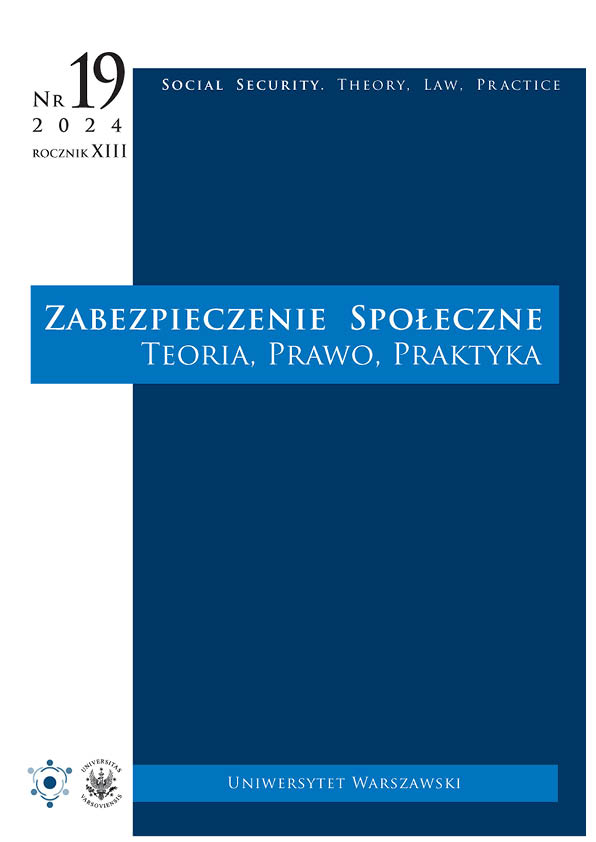Remote Work and the Employee's Binding Request to the Employer
https://doi.org/10.31971/2299-2332.2024.19.5
Keywords:
remote work, labor market, employment, privilege persons, disabilityAbstract
This article concerns remote work implemented under Article 6719 of the Labor Code, which was enacted and introduced into the Polish legal system along with amendments to the Labor Code introducing Chapter IIc regarding remote work (provisions came into force on April 7, 2023). Legislative changes in this area will have a significant impact on the labor market, including the foreign workers' labor market and their employment methods in Poland. The Covid-19 pandemic of 2020 and its consequences in the form of introducing an epidemiological emergency state in the country and the resulting necessity for isolation led to sudden and previously unforeseen temporary changes in work performance methods. Almost all representatives of professions where it was possible to work from home (or another place of isolation) and communicate with the employer through remote communication means were directed to work remotely. National legislation was not prepared for such a change. During that period, telework regulations were used, although they were sparse, inflexible, and imperfect. As a result of the pandemic, urgent work was undertaken to introduce amendments to the Labor Code that would more broadly regulate issues of performing professional tasks remotely. The article contains an analysis of one form of remote work implemented under Article 6719 in connection with Article 1421 and the rights and obligations of both parties to the employment relationship in the context of remote work implementation in the aforementioned mode (which concerns privileged persons, including those caring for persons with disabilities) both on the employee's and employer's side.
References
Binder Piotr, „Praca zdalna w czasie pandemii i jej implikacje dla rodzin z dziećmi – badanie jakościowe”, Przegląd Socjologii Jakościowej tom 18, nr 1/2022, (Wydawnictwo UŁ, Łódź 2022.
Gładoch Monika, Praca zdalna w praktyce. Zagadnienia prawne, Wyd. Pedagogium WSNS, Warszawa 2020.
Walczak Krzyszstof, Wojewódka Marcin (red.), Prawo pracy dla sędziów i pełnomocników, C.H.Beck, seria Praxis, Warszawa, 2023.
Gładoch, Monika, Praca zdalna. Kontrola trzeźwości. Nowelizacja Kodeksu pracy. Komentarz, Warszawa 2023.
Karasek, Aneta, „Praca zdalna w trakcie pandemii Covid-19”, w: Mędryk I. (red.), Zarządzanie zasobami ludzkimi w nowej przestrzeni
fizycznej i społecznej, Warszawa: Difin, 2021.
Król, Małgorzata, Praca zdalna, cechy, uwarunkowania, implikacje dla procesu pracy. Katowice, Wyd. Uniwersytetu Ekonomicznego w Katowicach, 2022.
Mędrala, Małgorzata (red), Praca zdalna w polskim systemie prawnym. Warszawa, Wolters Kluwer, 2021.
Moczydłowska, Joanna, Nowe trendy na rynku pracy – praca w systemie home office w percepcji polskich menedżerów. Marketing i Rynek 4, 2021.
Praca zdalna. Obowiązki i uprawnienia pracowników i pracodawców, Niezbędnik Kadrowo-płacowy, INFOR 2024.
Prusik, Adrian, Praca zdalna. Praktyczny przewodnik po nowych przepisach. Warszawa, Wolters Kluwer Polska, 2023.
Sobczyk Arkadiusz (red.) Kodeks Pracy. Komentarz, C.H.Beck, Warszawa 2023,
Spytek-Bandurska, Grażyna, w: Muszalski Wojciech, Walczak Krzysztof (red.) Kodeks Pracy. Komentarz, 2024, system legalis, [dostęp: 27.12.2024].
Suknarowska-Drzewiecka Ewa, w: Walczak Krzysztof (red.), Kodeks Pracy, Komentarz, C.H. Beck, Warszawa 2023.
Walczak Krzysztof (red.), Kodeks Pracy, Komentarz, C.H. Beck, Warszawa 2023.
Muszalski, Wojciech, Walczak Krzysztof, Kodeks pracy. Komentarz 2024, wyd. 14, Warszawa 2024.
STRONY INTERNETOWE/WEBSITES
https://mfi les.pl/pl/index.php/Organizacja pracy

Downloads
Published
Issue
Section
License
This article is published under the Creative Commons Attribution 4.0 International (CC BY 4.0) license.
Full license text: https://creativecommons.org/licenses/by/4.0/
The author retains copyright and grants the editorial office a non-exclusive license to publish the article.
